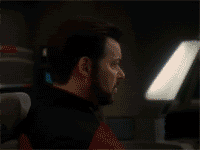Because my inner media studies major rages like a maniac when people diss Wikipedia, I shall now launch my righteous wall of text that no one will read:
The first systematic study of the quality of Wikipedia articles was published as this book was going to press. The journal Nature compared 42 science articles from Wikipedia to the gold standard of the Encyclopedia Britannica, and concluded that “the difference in accuracy was not particularly great.” On November 15, 2004, Robert McHenry, a former editor in chief of the Encyclopedia Britannica, published an article criticizing Wikipedia as “The Faith-Based Encyclopedia.” As an example, McHenry mocked the Wikipedia article on Alexander Hamilton. He noted that Hamilton biographers have a problem fixing his birth year—whether it is1755or1757. Wikipedia glossed over this error, fixing the date at 1755. McHenry then went on to criticize the way the dates were treated throughout the article, using it as an anchor to his general claim: Wikipedia is unreliable because it is not professionally produced. What McHenry did not note was that the other major online encyclopedias like Columbia or Encarta—similarly failed to deal with the ambiguity surrounding Hamilton’s birth date. Only the
Britannica did. However, McHenry’s critique triggered the Wikipedia distributed correction mechanism. Within hours of the publication of McHenry’s Web article, the reference was corrected. The following few days saw intensive cleanup efforts to conform all references in the biography to the newly corrected version. Within a week or so, Wikipedia had a correct, reasonably clean version. It now stood alone with the Encyclopedia Britannica as a source of accurate basic encyclopedic information. Incoming to curse it, McHenry found himself blessing Wikipedia.
...
Perhaps the most interesting characteristic about Wikipedia is the self-conscious social-norms-based dedication to objective writing. Unlike some of the other projects that I describe in this chapter, Wikipedia does not
include elaborate software-controlled access and editing capabilities. It is generally open for anyone to edit the materials, delete another’s change, debate the desirable contents, survey archives for prior changes, and so forth. It depends on self-conscious use of open discourse, usually aimed at consensus. While there is the possibility that a user will call for a vote of the participants on any given definition, such calls can, and usually are, ignored by the community unless a sufficiently large number of users have decided that
debate has been exhausted. While the system operators and server host—
Wales—have the practical power to block users who are systematically disruptive, this power seems to be used rarely. The project relies instead on social norms to secure the dedication of project participants to objective
writing. So, while not entirely anarchic, the project is nonetheless substantially more social, human, and intensively discourse- and trust-based than the other major projects described here.
-Yochai Benkler, Wealth of Networks chapter 3, copypasta'd and unspaced from my homework reading












